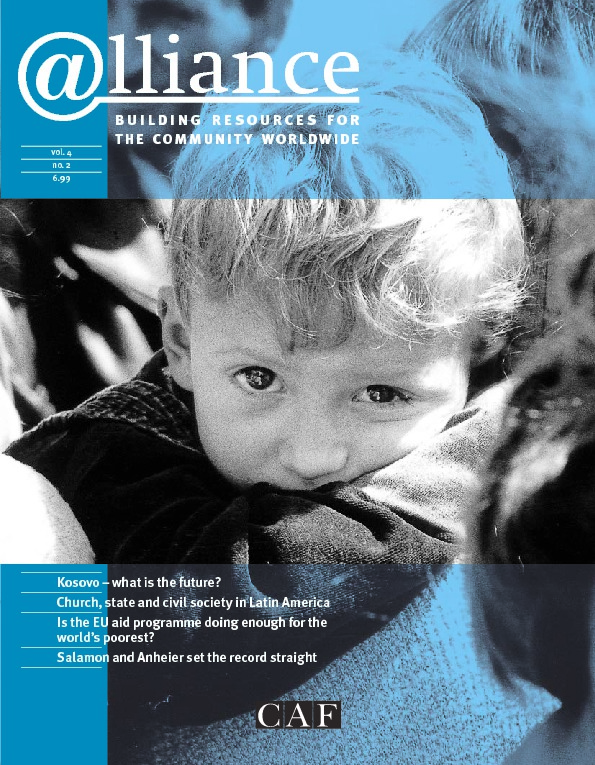‘Sometimes when you see how these peaceful Albanian peasants have been slaughtered without cause, their possessions taken, their wives and children left to starve, your heart really breaks with the sorrow of it. … Entire Albanian villages had been turned into pillars of fire, dwellings, possessions accumulated by fathers and grandfathers were going up in flames.’ Not Kosovo in the spring of 1999, but Leon Trotsky writing in 1912 (The Balkan Wars 1912–13).
In 1912 the Serbs swept into their historical heartland for the first time since their defeat by the Turks in 1389. Once there, they found a land populated overwhelmingly by Albanian Muslims – over 90 per cent of the population.
Neither the demography nor the passions have changed much. ‘The single sound of that word — Kosovo – caused an indescribable excitement … Our mothers lulled us to sleep with songs of Kosovo.’ So wrote a young Serb soldier heading off to war with the Turks almost 90 years ago. And a Serb living in the UK in 1999: ‘Every man in Serbia will die for Kosovo. If NATO sends in ground troops, I will go back to fight for Kosovo’ (Guardian, 8/5/99).
What is abundantly clear from these quotes is that the ‘Kosovo problem’ has been around for a very long time. This leaves urgent questions to be answered by the whole international funding community. What went wrong? Was there anything we could have done to prevent the most recent chapter in the tragedy?
The recent history
The constitution of the former Federal Republic of Yugoslavia was designed to provide checks and balances on the power of its most powerful members Serbia and Croatia. Within Serbia the two areas of distinct minority ethnic identity — Kosovo (Albanian) and Vojvodina (Hungarian) – were given a significant degree of local autonomy. Kosovo was always regarded as a potentially explosive area.
It was events in Kosovo that signalled the beginning of the breakup of the former Federation, with Milosovic as a senior Communist official first adopting a conciliatory response to Kosovan grievances and then, as the force of Serb nationalism became apparent, throwing in his lot with Serb extremists. The autonomy accorded to Kosovo and to Vojvodina was withdrawn in 1989 and subsequent legislation ostensibly aimed at the privatization of health care and certain sections of the economy was used as a pretext for the replacement of ethnic Albanian professionals by ethnic Serbs. ‘Ethnic cleansing’ began in employment, at first taking the form of enforced economic migration.
It was at this stage that the Kosovans began to set up the astonishing system of self-help described by Barry Knight elsewhere in Alliance (p27). ‘The Kosovans ran their own education and health systems for ten years,’ says Mabel Wisse-Smit of the Open Society Institute in Brussels. ‘They were like a huge NGO.’
The problems of Kosovo were widely recognized in the West (Misha Glenny, David Owen, Lawrence Eagleburger) and would have claimed greater Western political support had it not been for the well-timed intervention of Milosovic before Dayton as a ‘peace maker’ in Bosnia-Hercegovina. There were pleas at the time to extend the scope of Dayton to include Kosovo and Macedonia, but the US was reluctant to antagonize its temporary ‘ally’ in Belgrade. There is evidence that subsequent US intervention has been aimed at reducing the temperature of Kosovan resistance to Serb domination by assuring Kosovan leaders that timely Western support would be available if required. One legacy of Dayton — and increasingly of the Nato intervention — is a growing cynicism among Kosovans and other threatened ethnic minority groups in the Balkans about the willingness of Western countries to provide effective assistance
Neglect by the West
Kosovo and the Kosovans, but also Serbia and the Serbs, have been victims of neglect by the West for almost ten years. Serbia has its own grievances, and Serbs too have been the victims of ethnic cleansing. Successive embargoes, and periods of exclusion from international aid programmes, for example, the UK Know How Fund and EU Phare, have resulted in severely limited support for economic reconstruction and, more significantly, for civil society institutions. There was even a period when the UK-based Charity Know How could not provide support in Serbia or Croatia on the same basis as to much less ‘needy’ states such as Slovenia (the British government money supposed to ‘match’ foundation money under the scheme was not forthcoming for these countries).
The recent experience in former Yugoslavia as a whole reinforces the need for a differentiation between the treatment of regimes and peoples. Serbia as a whole has suffered because of the stance of a government with only minority support. Groups and individuals working for a more democratic society and a greater respect for human and civil rights have been ‘punished’ along with supporters of the authoritarian regime. How logical is it for funders to withhold support for building democracy and a strong civil society because a country has a repressive regime when these are by definition the very countries that need support the most?
Too little much too late
Despite the evidence of relative neglect, however, it would be wrong to dismiss Western assistance completely. There has been substantial assistance in bridge-building by some Western NGOs – above all the Soros national foundations in countries throughout the region — and both USAID and the EU have financed NGO support, with more limited assistance from individual EU members, including Germany, Denmark and the UK. But sadly it was very much a matter of too little much too late. It is only after the most recent horrors of Kosovo that the West seems to be taking half-seriously the long-discussed and often ridiculed proposals for a ‘Marshall plan for the Balkans’, suggested by George Soros many years ago.
The recent proposal by the EU Presidency (Germany) and the World Bank for a Stability Pact for South-East Europe is a belated recognition of the scale of economic need in the region and the importance of a settlement for the whole of the Balkans which will provide the resources for development and guarantee the security of all ethnic groups. The warm welcome for the proposal by governments in the region reflects their concern that conflicts and ethnic tensions in the Balkans cannot be contained by national boundaries.
Could more support have made a difference?
Western money poured into Hungary, Poland and Czechoslakia (as it then was) following the fall of Communism in 1989, from governments, multilateral agencies and independent foundations. The accepted wisdom was that without such support democracy could not take root.
Why did the Balkans not receive similar treatment? ‘Uncertainty on the part of donors’ is part of the answer offered by Jon Blyth, Mott Foundation Program Director for Central and Eastern Europe. ‘It was easier for them to understand Poland, the Czech Republic and Hungary, and Russia and Ukraine were too important to ignore.’ Another factor was the risk of failure: donors wanted success early. ‘If the CEE countries succeeded, it would bring in others.’
Would equivalent sums going into the Balkans have made the difference? And would it be effective today? There is general agreement that much of the early support for CEE countries was misdirected. Lessons have been learned and today’s assistance would almost certainly be better targeted.
A more fundamental question, however, is whether any amount of financial support can make a difference if the political climate is not supportive of individual and group initiative. Barry Knight (p27) concludes that civil society is ‘a fragile condition, easily broken’, existing to some extent because it is allowed to exist. Or, in the words of a Slovak NGO leader, ‘Government is not outside society, but part of it. You can’t have a civil society without a civil government.’
The undoubted success of the JCDC/MICOM community development and conflict resolution team in Moldova (see below) underlines the potential for NGOs and communities to assist the process of reconstruction, to give reality to the efforts of political representatives and to provide early warning of emerging threats to stability.
Ian Bell is Director of Civil Society Development at CAF.
Community development and conflict resolution in Moldova
When it comes to dealing with the long-term effects – and indeed causes — of the present crisis in the Balkans, there may be lessons to be learned from the experience of dealing with ethnic divisions elsewhere in south-east Europe.
In 1992, shortly after the re-establishment of the Republic of Moldova as an independent state, hostilities broke out between the Moldovan government and the area east of the Dniestr River, whose predominantly Slav population were fearful of the trend towards ‘Romanianization’ of the Moldovan state. More than six months of full-scale military conflict ensued, with its concomitants of killing, the destruction of property and the forced movements of populations. A ceasefire negotiated in July 1992 by Moldovan President Snegur and the Russian president left the country divided into two conflicting entities – ‘Moldova proper’ and Transdniestria. Both territories have suffered desperate economic and social consequences from the de facto partition of the country, and the complexities of regional politics and unresolved conflict have threatened the stability not just of Moldova but of the wider region.
A Belfast-based community development and conflict resolution organization, the Moldovan Committee of Management (MICOM), has been working in Moldova since the outbreak of hostilities. As an independent third party, MICOM has won the trust of community leaders from both sides of the political and ethnic divide and been invited by the political leadership to extend its work to conflict resolution.
Increasingly the initiative in community-building has passed to MICOM’s local partners, the Joint Committee for Conciliation and Democratization (JCKC). For seven years, with support from a variety of sources including the C S Mott Foundation and the UK Foreign Office, MICOM and JCDC have been able to maintain developmental contacts at many levels, even when political dialogue has ceased. A strong programme of links with Northern Ireland has enabled Moldovans to study the effects of long-term unresolved conflict and the value of ‘cross-community’ activity in maintaining progress towards resolution even when political processes are blocked.
MICOM’s approach to conflict resolution coexists happily in Moldova with the more formal efforts of the Organization for Security and Cooperation in Europe (OCSE) and the mediating powers (Russia and Ukraine) to reach a formal constitutional agreement. It has been commended by the mediators as a positive contribution to resolution and a safety valve when political difficulties are most acute.
There has been no return to open hostilities since 1992. JCDC and its associates on both sides of the Dniestr River have shown once again the capacity of NGOs to contribute positively to the process of conflict resolution and to respond to signs of impending breakdown by taking positive initiatives at community and political level. Sadly, this comparative success has received scant attention from the outside world, which seems to respond energetically only to total breakdown.
For further information about MICOM, phone director Joe Camplisson on +44 1232 222 400.





Comments (0)